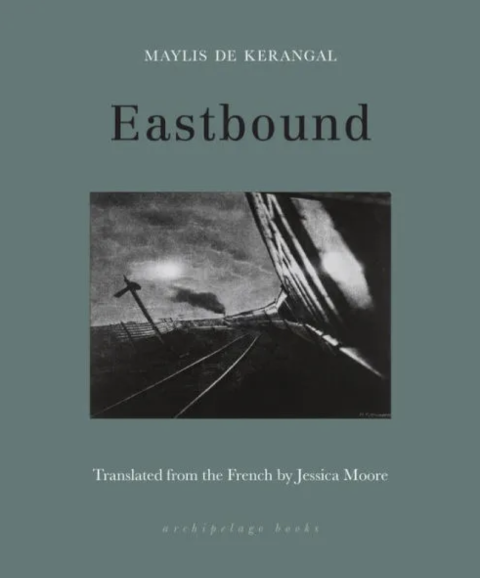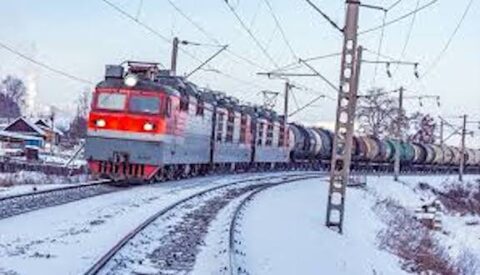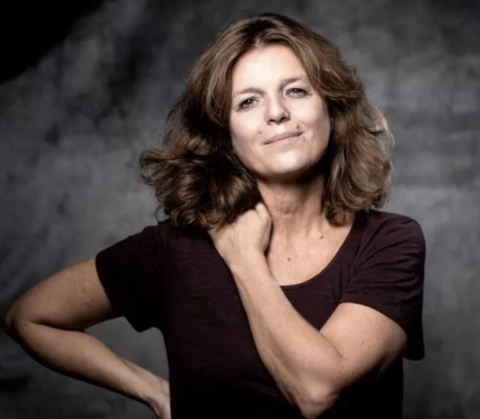Eastbound, the novella by French writer Maylis De Kerangal and translated by Jessica Moore, takes place on a passenger train. The Trans-Siberian Railway connects Moscow and Vladivostok, spans 9,289 kilometers (5,772 miles), and takes about seven days to travel. It is the longest railway in the world, creating a corridor through the immense Siberian landscape, with villages “threaded along the tracks like beads on a necklace” and connecting Europe to Asia:
“Outside, it’s still the same chrome-painted night and the train rolls unerringly, crossing time zones. The train compresses or dilates the hours, concretes the minutes, stretches out the seconds, continues on pegged to the earth and yet out of sync with the earth’s clocks: the train like a spaceship.”
 We encounter Aliocha traveling in a cramped and dirty third-class carriage, along with fellow conscripts from Moscow who don’t have the resources or ingenuity to escape their mandatory military service. He intends to desert at the next station. There’s a timeless aura in the setting. The screens of cellphones and laptops piercing the darkness around him are the only indication we are in the 21st century, and he is not a member of Stalin’s Army headed to the Eastern Front.
We encounter Aliocha traveling in a cramped and dirty third-class carriage, along with fellow conscripts from Moscow who don’t have the resources or ingenuity to escape their mandatory military service. He intends to desert at the next station. There’s a timeless aura in the setting. The screens of cellphones and laptops piercing the darkness around him are the only indication we are in the 21st century, and he is not a member of Stalin’s Army headed to the Eastern Front.
In Krasnoyarsk, Hélène boards the same eastbound train, though her situation is very different. Thirty-six years old and French, she came to Siberia with her Russian lover, Anton. Unable to adjust, she feels “out of place, out of her own climate, her language, blind and deaf she would say over and over, laughing, and alone.” A few hours earlier, after blowing kisses to Anton as he drove off to work, Hélène ran away. She ran East rather than West, which even she admits is absurd, paying for a private compartment to Vladivostok and the Sea of Japan – the last stop on the Trans-Siberian.
When Hélène wanders into the third-class carriage, she finds Aliocha staring out the window, trying to formulate a new escape plan after failing his first attempt in Krasnoyarsk. They spend the night companionably drinking and smoking together, despite their inability to understand each other’s language. Theirs isn’t a romantic connection. Aliocha is disappointed when Hélène tells him she is French and not American. Morning brings more surprises: she is older than he thought, twice his age. Hélène is startled to realize he is “just a kid.” He might be her son.
DeKerangel’s characters are lonely, afraid, and unable to untangle themselves from their own egos. Aliocha is deserting because he fears the other conscripts. His “heart wallops in his chest as the train chugs along at a constant speed just like the boy’s terror will, from here on in.” He knows there will be hazing at the barracks. So his mind jumps to the most extreme and violent scenarios. He imagines the tortures the second-year conscripts will perpetrate on him and his inability to stop them. “If they make him lick the toilets, deprive him of sleep or fuck him up the ass, no one will be able to do anything to help.” His very real fear borders on the irrational.
Hélène’s crisis, by comparison, is just as real but more existential and, ultimately, very French. The Russian edition of Rosetta Stone could go a long way toward solving her problems.
 Desperate and inept, Aliocha asks for Hélène’s help, and she agrees. She leads him from the squalor of third class and hides him in her first-class compartment. Her decision seemingly is made on a whim. We understand there are real stakes for Aliocha if caught deserting. What repercussions Hélène, “the foreigner” with a prominent Russian boyfriend, faces for helping him are unclear, as is her motivation:
Desperate and inept, Aliocha asks for Hélène’s help, and she agrees. She leads him from the squalor of third class and hides him in her first-class compartment. Her decision seemingly is made on a whim. We understand there are real stakes for Aliocha if caught deserting. What repercussions Hélène, “the foreigner” with a prominent Russian boyfriend, faces for helping him are unclear, as is her motivation:
“Aliocha takes her hand and leaning forward as always murmurs rapidly spassiba, spassiba, Hélène shakes her head, it’s nothing, it’s nothing, pulls her hand back, relieved … that this whole thing is ending, ready to look back with a knot in her stomach on this sordid scenario where she gave herself the lucky draw, proclaimed herself the hero, the stranger who descends from the sky, saves you and then slips away, ready to rack up self-convincing statements – I did my utmost, I did all that I could – all the while knowing she’s incapable of believing it: the worm of guilt is already lodging itself in her gut.”
These two comprise apt representations of Europe and Russia, West meets East, dynamically different cultures sharing a single landmass and a less-than-perfect understanding of each other. In this scenario, it’s easy to be critical of Hélène, who “doesn’t speak a word of Russian, but she’s read Anna Karenina three times, hums the music of Doctor Zhivago and still knows the taiga, the tundra, and the steppe by heart, geography-textbook definitions.” As she travels farther east and away from Anton, she wonders if she’d have fallen in love with him if he hadn’t been “from the forbidden country.” She believes she’ll only have to shelter Aliocha for fourteen hours. She is annoyed when she realizes she’ll have to share her private compartment longer with this boy, who is the opposite of Anton and her romanticized construct of Russia. And yet, for all Hélène’s conflicting motivations and emotions, she never seriously considers abandoning him.
 De Kerangel establishes the perfect scenario to observe her characters’ confused desires and how they are thwarted. The final pages of Eastbound become a tense game of hide and seek, made all the more nerve-wracking because, though the protagonists can interpret the broad strokes of each other’s emotional responses, their inner lives remain opaque to each other. As the train approaches Chita where the soldiers are set to disembark, Aliocha must hide from other passengers, fellow conscripts, Sergeant Letchov, and the ever-present provodnistas (attendants).
De Kerangel establishes the perfect scenario to observe her characters’ confused desires and how they are thwarted. The final pages of Eastbound become a tense game of hide and seek, made all the more nerve-wracking because, though the protagonists can interpret the broad strokes of each other’s emotional responses, their inner lives remain opaque to each other. As the train approaches Chita where the soldiers are set to disembark, Aliocha must hide from other passengers, fellow conscripts, Sergeant Letchov, and the ever-present provodnistas (attendants).
Throughout Eastbound, Jessica Moore’s translation meets the pivoting demands of De Kerangel’s prose — preserving the terse, staccato sentences that relate action inside the train, and ably handling the flowing descriptions of the Russian landscape. Everything, except for a few flashbacks, is written in the third-person present, underscoring the mounting urgency of the situation. Prose and plot are propelled forward, perfectly in sync.
These acts of running and deserting are recklessly aimless — despite the possibility of a mutually satisfying ending. Hélène is running in the wrong direction. Aliocha has no plan for what comes next. And when examined too closely, their motivations and decisions lack a determined logic. Without a common language, Aliocha and Helene operate in parallel, each one a closed system incapable of fully intersecting. Their relationship, born of coincidence more than abiding connection, illuminates the fraught relations between the West and its Russian antagonists.
[Published by Archipelago Books on February 7, 2023, 137 pages, $18 US / $23 CAN. Originally published as Tangente vers in 2012 by Editions Gallimard.]